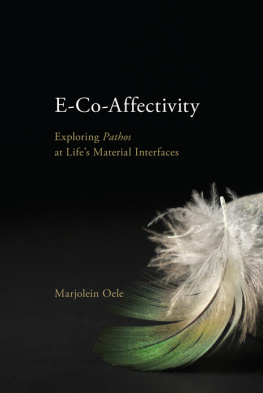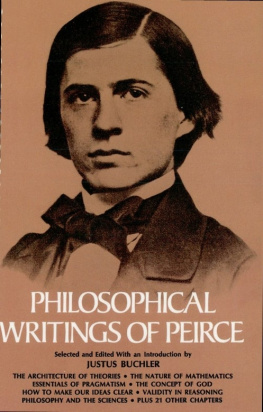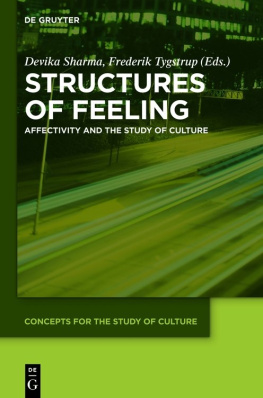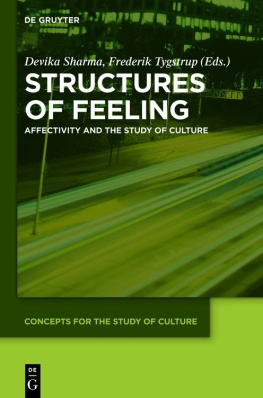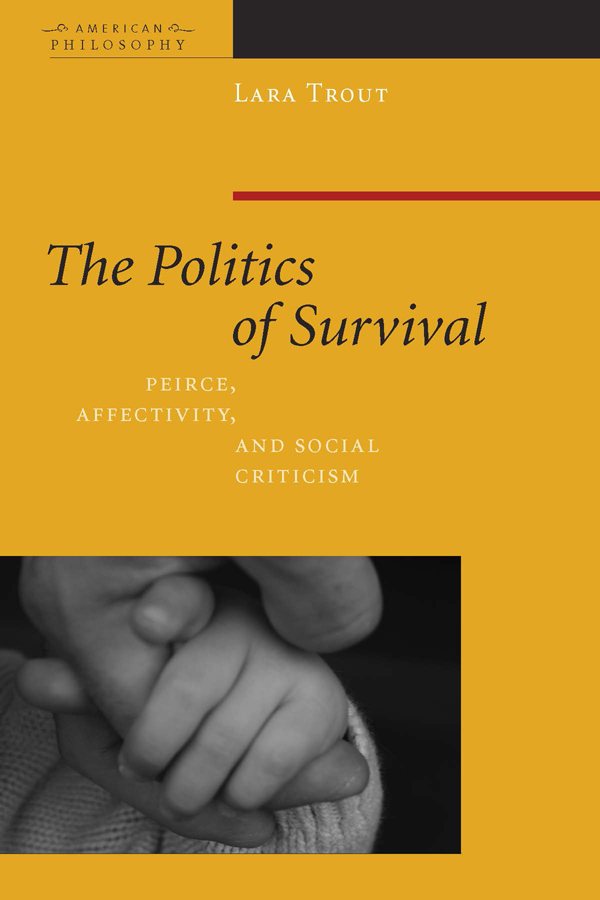Contents
Guide
THE POLITICS OF SURVIVAL

Copyright 2010 Fordham University Press
Open Access edition funded by the National Endowment for the Humanities/Andrew W. Mellon Foundation Humanities Open Book Program.

All rights reserved. No part of this publication may be reproduced, stored in a retrieval system, or transmitted in any form or by any meanselectronic, mechanical, photocopy, recording, or any otherexcept for brief quotations in printed reviews, without the prior permission of the publisher.
Fordham University Press has no responsibility for the persistence or accuracy of URLs for external or third-party Internet websites referred to in this publication and does not guarantee that any content on such websites is, or will remain, accurate or appropriate.
Visit us online at www.fordhampress.com.
Library of Congress Cataloging-in-Publication Data
Trout, Lara.
The politics of survival : Peirce, affectivity, and social criticism / Lara Trout.1st ed.
p. cm. (American philosophy series)
Includes bibliographical references and index.
ISBN 978-0-8232-3295-6 (cloth : alk. paper)ISBN 978-0-8232-3297-0 (ebook : alk. paper)
1. DiscriminationSocial aspects. 2. Prejudices. 3. CognitionPhilosophy. 4. Peirce, Charles S. (Charles Sanders), 18391914. I. Title.
HM1091.T76 2010
303.385dc22
2010005584
Printed in the United States of America
12 11 10 5 4 3 2 1
First edition
To
Lisa Kammerer
and
Samantha Kolinski
Contents
CP | Collected Papers of Charles Sanders Peirce (195865) |
EP | The Essential Peirce (1992, 1998) |
RLT | Reasoning and the Logic of Things (1992) |
W | Writings of Charles S. Peirce: A Chronological Edition, Vols. 13 (198286) |
I have many people to thank. Doug Anderson is very much at the top of the list. The support he has given me for my unconventional reading of Peirces work has been vital to this projects growth. Thank you, Doug! Thanks, too, to Helen Tartar at Fordham University Press, who believed in this project and helped me bring it into its finished form.
I thank Vincent Colapietro, whose love for Charles S. Peirce and classical American philosophy helped to form and fuel my own. Shannon Sullivan has been a model for me of the fruitfulness of bringing classical American philosophy into dialogue with feminism and race theory. She has also very generously provided comments on my work whenever I needed her to. Nancy Tuana also has been an important mentor for me in my formation as a feminism and race theory scholar. Other key supporters of my work on Peirce and social criticism are Mitchell Aboulafia, Dan Conway, Claire Katz, and Cathy Kemp. Without all these individuals, with whom I worked at Penn State University when I was a graduate student there (20056), my work in this book would not have stable roots. I also thank Terry McGrail, Staci Kelly, Toni Mooney, and Mona Muzzio, who provided me with friendship and technical support during my years at Penn State. Other friends to this project include Leigh Johnson, who let me sit in on her Philosophy and Race class at Penn State University in the spring of 2005. The connections I was able to draw between race theory and Peirces ideas benefited a great deal from what I learned in her class. I also had many fruitful conversations about Peirces ideas with classmates Daniel Campos, David OHara, and Michael Ventimiglia.
In the transformation process through which this book has grown into its present form, I have had the support of many. Roberto Frega and Roger Ward each gave my penultimate manuscript a thorough and critical read. I thank them both for their many criticisms and suggestions. Dwayne Tunstall provided invaluable critiques and also helped me frame my work in better dialogue with race theory issues. Bill Lawson took the time to talk with me about my work, challenging me to frame my project more rigorously on the race theory front. Daniel Campos provided insightful feedback and suggestions, as well as encouragement. Judith Green has been a wonderful source of support and advice about the book-writing process. Lisa Heldke has served in this capacity as well and has offered content suggestions when I needed them. And Marcia Moenthank you so much for all your support and advice in the specific world of Peirce, affectivity, and social criticism.
My thanks to the University of Portland for supporting my work on this book through funding from the Butine Grant. I thank Norah Martin for being an incredibly supportive department chair who goes out of her way to support my research. Alex Santana has been an extraordinarily generous interlocutor, happy to give me feedback as I was working through my ideas at various points. Jeff Gauthier read my introduction with a fine-toothed comb and gave me many detailed and helpful comments. Rayne Funk was always there to help me with technical support. Kaycie Rueter, Jayme Schroeder, Tyler Bryan-Askay, Megan Smith, and Chelsea Egbert have also provided technical support. Thank you all! Thanks too to Richard Askay, Jim Baillie, Caery Evangelist, Thom Faller, Jessica Logue, and Peg Hogan, all of whom have been wonderful colleagues to work with throughout this process. Thanks, as well, to Fay Beeler, Devon Goss, Melanie Gangle, Kenneth Laundra and Amanda Mosher for fielding short-notice questions from me as I was completing work on the final manuscript. Thanks too to my Philosophy and Feminism and Self and Identity students over the years at the University of Portland. They have helped me develop my work on this project through their own engagement with Peirces ideas in conjunction with issues in social criticism.
I thank the many audience members who gave me feedback about my work at conferences for the Association for Feminist Epistemologies, Methodologies, Metaphysics and Science Studies; the Society for the Advancement of American Philosophy; the Society for Women in Philosophy (Pacific Division); the Summer Institute in American Philosophy; PhiloSOPHIA; the International Meeting on Pragmatism; and Pedagogy and Theater of the Oppressed. I also received helpful audience feedback at a presentation I gave at Lewis and Clark College, in Portland, Oregon.
Thank you very much to Eric Newman, Nicholas Frankovich, and Sonia Fulop at Fordham University Press, who helped prepare the manuscript for publication.
I have been blessed with many stalwart friends who have supported me through thick and thin throughout this project, many of whom have already been mentioned. I need to add several names to this list. Kelly Burns and Samantha Kolinski are dear friends whom I have known from way back. Evgenia Cherkasova is a newer friend who was a blessing in my life during the years we were in State College, Pennsylvania, together. Thank you to Bobbi Hokenson for the idea for the cover photo, and for the photography itself. And thanks to Milo, John, and Stephanie Salomone for posing for the cover photo. I really appreciate your help! Thanks, too, to Dr. Leigh Kochan Lewis, Dr. Suzanne Lady, and Lovejoy Chiropractic, as well as Virginia Fidel and Robin Rice.
Dad and Mom, thank you for the love of learning you have fostered in me for as long as I can remember. Eric and Mandy, thank you for believing in me. Parker and Sydney, thank you for being your adorable selves! And, of course, Lisa, who has given me so very much; Dan; and their incredible children, Eva (Mayo!), Natalie, and Ben, whose love helps me keep my center. Y Absa, gracias a ti tambin. Eres un regalo.





